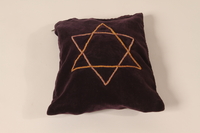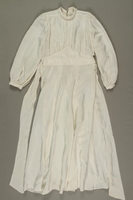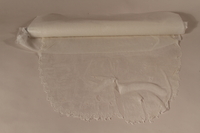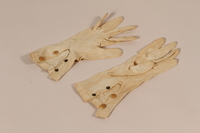Overview
- Description
- Postcard: black and white image of man and woman seated next to each other, both with hands crossed on their lap.
- Credit Line
- United States Holocaust Memorial Museum Collection, Gift of Lilly Friedman
Physical Details
- Genre/Form
- Postcards.
- Extent
-
1 Photographic postcard.
Rights & Restrictions
- Conditions on Access
- There are no known restrictions on access to this material.
- Conditions on Use
- The Museum is in the process of determining the possible use restrictions that may apply to material(s) in this collection.
Administrative Notes
- Holder of Originals
-
United States Holocaust Memorial Museum
- Legal Status
- Permanent Collection
- Provenance
- Donated to the United States Holocaust Memorial Museum in 1998 by Lilly Friedman.
- Record last modified:
- 2023-09-15 10:14:08
- This page:
- https://collections.ushmm.org/search/catalog/irn13665
Download & Licensing
- Copyright Not Evaluated
- Terms of Use
- This record is not digitized and cannot be downloaded online.
In-Person Research
- Request 7 Days in Advance of Visit
- Plan a Research Visit
-
Request in Shapell Center Reading Room
Bowie, MD
Contact Us
Also in Lilly and Aaron Friedman family collection
The collection consists of an apron, greeting cards, tallit bag, wedding dress, veil, gloves, documents, correspondence and photographs relating to the experiences of Lili Lax Frydman and Ludwig Frydman after the Holocaust in Celle displaced persons camp in Germany and in the United States after their emigration in 1948. Some of these materials may be combined into a single collection in the future.
Date: 1945-1970

Purple velvet tallit pouch made by a woman for her fiance in a DP camp
Object
Purple velvet tallit bag with a Star of David sewn by Lili Lax, 21, for her husband-to-be Ludwig Frydman, 22, for their January 27, 1946, marriage in Celle displaced persons camp. It stores the tallit, or prayer shawl, used by observant Jewish men. Ludwig, his parents Michal and Gizella, and 11 siblings lived in Sevlus, Czechoslovakia, which was annexed by Hungary in 1939. In March 1944, Germany invaded Hungary and soon began the systematic deportation of all Jews to concentration camps. Ludwig was confined to Munkacs ghetto and then deported to Auschwitz and Bergen-Belsen. Ludwig’s parents and 7 siblings perished. Lili, her father Yitzhak, and 4 younger siblings Faige, Eva, Mechel, and Eli, were from Zarici, Czechoslovakia. In June 1944, Lili and her family were sent from Munkacs ghetto to Auschwitz. Lili’s father and brothers were immediately gassed. Lili and her sisters survived imprisonment in Płaszów, Neustadt in Oberschlesien, Gross-Rosen, and Bergen-Belsen concentration camps. They were liberated by British forces on April 15, 1945. Most of Lilly's extended family perished. Lili and Ludwig met in Celle dp camp in June 1945. With their 10 month old daughter and Lili's sister Eva, they left Celle in 1948 to join her sisters in New York.

Wedding gown made from a parachute worn by Lili Lax Friedman and many additional Jewish brides in a DP camp
Object
White wedding dress worn by Lili Lax, 22, for her marriage to Ludwig (Aron) Frydman, 21, on January 27, 1946, in a synagogue near Celle displaced persons camp in Germany. Lili told Ludwig that she had always dreamed of getting married in a white dress, so he obtained a white rayon parachute from a former German airman for two pounds of coffee and cigarettes. Lili used her cigarette rations to hire a seamstress, Miriam, to sew the gown. Miriam used the leftover material to make a shirt for Ludwig, 1999.126.1. Six months later, Lilly's sister wore the gown when she married, and then their cousin Rosie wore it. Lili lent the dress to many more brides, although she quit counting at 17. Ludwig, his parents Michal and Gizella, and 11 siblings lived in Sevlus, Czechoslovakia, which was annexed by Hungary in 1939. In March 1944, Germany invaded Hungary and soon began the systematic deportation of all Jews to concentration camps. Ludwig was confined to Munkacs ghetto and then deported to Auschwitz and Bergen-Belsen. Ludwig’s parents and 7 siblings perished. Lili, her father Yitzhak, and 4 younger siblings Faige, Eva, Mechel, and Eli, were from Zarici, Czechoslovakia. In June 1944, Lili and her family were sent to Auschwitz. Lili’s father and brothers were immediately gassed. Lili and her sisters survived imprisonment in Płaszów, Neustadt in Oberschlesien, Gross-Rosen, and Bergen-Belsen concentration camps. Bergen-Belsen was liberated by British forces on April 15, 1945. Lili and Ludwig met in Celle dp camp in June 1945. With their 10 month old daughter and Lili's sister Eva, they left Celle in 1948 to join her sisters in New York.

Wedding veil worn by Lili Lax Friedman and many additional Jewish brides in a DP camp
Object
Wedding veil worn by Lili Lax, 22, for her wedding to Ludwig (Aron) Frydman, 21, on January 27, 1946, in a synagogue near Celle displaced persons camp in Germany. Lili told Ludwig that she had always dreamed of getting married in a white dress, so he obtained a white rayon parachute from a former German airman for two pounds of coffee and cigarettes. The veil is made from 11 feet of netting, and could be styled in different ways. Six months later, Lilly's sister wore the gown, 1999.7.12 a, and veil when she married, and then their cousin Rosie wore them. Lilly lent the wedding ensemble to many more brides, although she quit counting at 17. Ludwig, his parents Michal and Gizella, and 11 siblings lived in Sevlus, Czechoslovakia, which was annexed by Hungary in 1939. In March 1944, Germany invaded Hungary and soon began the systematic deportation of all Jews to concentration camps. Ludwig was confined to Munkacs ghetto and then deported to Auschwitz and Bergen-Belsen. Ludwig’s parents and 7 siblings perished. Lili, her father Yitzhak, and 4 younger siblings Faige, Eva, Mechel, and Eli, were from Zarici, Czechoslovakia. In June 1944, Lili and her family were sent to Auschwitz. Lili’s father and brothers were immediately gassed. Lili and her sisters survived imprisonment in Płaszów, Neustadt in Oberschlesien, Gross-Rosen, and Bergen-Belsen concentration camps. Bergen-Belsen was liberated by British forces on April 15, 1945. Lili and Ludwig met in Celle dp camp in June 1945. With their 10 month old daughter and Lili's sister Eva, they left Celle in 1948 to join her sisters in New York.

Pair of gloves worn by Lili Lax Friedman and many additional Jewish brides in a DP camp
Object
Pair of white, cotton, knit, wrist length gloves worn by Lilly Lax, 22, for her wedding to Ludwig (Aron) Frydman, 21, on January 27, 1946, in a synagogue near Celle displaced persons camp in Germany. Lili told Ludwig that she had always dreamed of getting married in a white dress, so he obtained a white rayon parachute from a former German airman for two pounds of coffee and cigarettes. Six months later, Lilly's sister wore the gown, 1999.12.a, and, presumably gloves, when she married, and then their cousin Rosie wore them. Lilly lent the wedding ensemble to many more brides, although she quit counting at 17. Ludwig, his parents Michal and Gizella, and 11 siblings lived in Sevlus, Czechoslovakia, which was annexed by Hungary in 1939. In March 1944, Germany invaded Hungary and soon began the systematic deportation of all Jews to concentration camps. Ludwig was confined to Munkacs ghetto and then deported to Auschwitz and Bergen-Belsen. Ludwig’s parents and 7 siblings perished. Lili, her father Yitzhak, and 4 younger siblings Faige, Eva, Mechel, and Eli, were from Zarici, Czechoslovakia. In June 1944, Lili and her family were sent to Auschwitz. Lili’s father and brothers were immediately gassed. Lili and her sisters survived imprisonment in Płaszów, Neustadt in Oberschlesien, Gross-Rosen, and Bergen-Belsen concentration camps. Bergen-Belsen was liberated by British forces on April 15, 1945. Lili and Ludwig met in Celle dp camp in June 1945. With their 10 month old daughter and Lili's sister Eva, they left Celle in 1948 to join her sisters in New York.
Contract issued for the marriage of two displaced persons
Document
Contract issued for the marriage of Aron Frydman (donor's husband) and Lili Laks (donor), January 1946.
Letter written by Lady R. Henriques
Document
Letter written by Lady R. Henriques, November 1968, London, England, addressed to Mr. Ludwig Friedman in Brooklyn, NY; acknowledges previous letter, discusses personal health, and other friends.
Letter written by Lady R. Henriques
Document
Written by Lady R. Henriques, March 1968, London, England. Donated to the USHMM in 1998 by Lilly Friedman, addressed to "Mr. + Mrs. Friedman" in Brooklyn, NY from "Lady Henriques"; acknowledges photographs and acquaintances.
Letter sent to Ludwig Friedman
Document
Letter typed in black ink on blue paper; addressed to "Mr. Ludwig Friedman" in Brooklyn, NY from "L. Cohen" in Kyrenia, Cyprus, dated January 1970; acknowledges previous letter, offers congratulations and updates on whereabouts; in Greek.
Certificate issued for Lilly Lax and Ludwig Friedman
Document
Marriage certificate issued for Lilly Lax and Ludwig Friedman, May 1957, Brooklyn, NY, stating that Rabbi I.M. Olewski performed marriage of Ludwig Freidman and Lilly Lax.
Certificate
Document
Pages contain black and white images with hand-drawn borders and illustrations; includes images of soldiers, memorials, protests, and memorial services.
Certificate
Document
Pages contain black and white images with hand-drawn borders and illustrations; includes images of soldiers, memorials, protests, and memorial services.
Certificate
Document
Pages contain black and white images with hand-drawn borders and illustrations; includes images of soldiers, memorials, protests, and memorial services.
Floral embroidered apron worn by a Jewish Czech woman in a DP camp
Object
White apron with floral embroidery worn by Lili Frydman, 22, on Shabbat while working in a kosher kitchen in Celle displaced persons camp ca. 1945 to 1948. She wore a plain white apron the rest of the week. Lili lived in Zarici, Czechoslovakia, with her father Yitzhak Lax and four younger siblings, Faige, Eva, Mechel, and Eli, which was annexed by Hungary in 1939. In March 1944, Germany invaded Hungary. Soon they began the systematic deportation of all Jews to concentration camps. Circa June, Lili and her family were deported from Munkacs ghetto to Auschwitz. Lili’s father and brothers were immediately sent to the gas chambers. Lili and her sisters were selected for labor and sent to Płaszów slave labor camp in Krakow. As the Soviets approached, they were sent back to Auschwitz, and then to a slave labor camp in Neustadt in Oberschlesien. In January, Lilly and her sisters were sent on a death march to Gross-Rosen, and then to Bergen-Belsen on cattle cars. They were liberated by British forces on April 15, 1945. Lili and her sisters lived in Celle dp camp, where Lili met Ludwig Frydman, 21, in June 1945. He was deported from Munkacs to Auschwitz and then Bergen-Belsen. They married on January 27, 1946. With their 10 month old daughter and Lili's sister Eva, they left Celle in 1948 to join her sisters in New York.
Vintage photograph taken at a wedding
Document
Black and white image of 11 men and women standing together outside, bride standing incenter, two women seated on ground.
Vintage photograph taken at a wedding
Document
Black and white image of eighteen men and women grouped together outside, bride standing in center, four people seated on ground in front of her.
Photographic print
Document
Black and white image of two women outside standing on either side of sign/banner, third woman kneeling on ground in front.
Rosh Hashana card with a photo of a family made in Celle DP camp
Object
Rosh Hashana card for September 1947 made for Aron and Lili Lax Friedman, and, most likely, Lili's sister Eva, in Celle displaced persons camp in postwar Germany. It has a photograph of the three, with Lili holding her baby daughter. Lili and Aron met at the camp in June 1945 when Lili was waiting in line for food rations and Aron was working in the kitchen. He began bringing extra food for Lili and her sisters. She was not interested at first, but Aron was persistent and they married on January 27, 1946. During the war, Lili, her father Yitzhak, and younger siblings, Faige, Eva, Mechel, and Eli were deported from Munkacs, Hungary, to Auschwitz circa June 1944. Her father and two brothers were gassed immediately. Lili and her sisters were sent to Płaszów slave labor camp in Krakow. As the Soviets approached, they were sent back to Auschwitz, and then to a slave labor camp in Neustadt in Oberschlesien. In January, Lili and her sisters were sent on a death march to Gross-Rosen, and then to Bergen-Belsen on cattle cars. They were liberated by British forces on April 15, 1945. Ludwig was deported from Czechoslovakia to Auschwitz, and then Bergen Belsen. Nearly his entire family was killed. The four went to America in 1948, where they joined Lili's sisters.
Vintage photograph of a wedding
Document
Black and white image of 11 men and women standing together outside, bride standing in center, two women and one man seated on ground.
Vintage photograph of bride
Document
Black and white image of portrait of seated bride holding flowers.
Photographic print
Document
Black and white image of four women standing together outside, all wearing aprons.
Photographic print
Document
Black and white image of two men and two women standing together in room, woman second from left wearing wedding dress.
Rosh Hashana card with a photo of a young woman made in Celle DP camp
Object
Rosh Hashana greeting card for September 1947 made for, most likely, Eva Lax, a sister of Lili Lax Friedman, in Celle displaced persons camp in postwar Germany. It has a photograph of Eva and greetings for the New Year. During the war, Eva, her father Yitzhak, and four siblings, Lili, Faige, Mechel, and Eli were deported circa Junre 1944 from Munkacs, Hungary, to Auschwitz concentration camp. Her father and two brothers were gassed immediately. Eva and her sisters were sent to Płaszów slave labor camp in Krakow. As the Soviets approached, they were sent back to Auschwitz, and then to a slave labor camp in Neustadt in Oberschlesien. In January, Eva and her sisters were sent on a death march to Gross-Rosen, and then to Bergen-Belsen on cattle cars. They were liberated by British forces on April 15, 1945. Eva lived with her sister Lili, and her husband Aron Frydman, whom Lili met and married at the camp. Eva went to America in 1948, with Lili, Aron, and their infant, to join her sisters in New York.
Photographic print
Document
Black and white image of two women leaning out of open window on bus, one holding a baby, man reaching up to baby.
Photographic postcard
Document
Black and white image of portrait of man wearing military uniform. Inscribed on verso, "To my Friend +/Workmate Mr. Friedman/From Sgt. Hambi/No 3 D.P.A.C.S./June 1946."
Photographic print
Document
Black and white image of two women standing on either side of man holding up flag, small child standing in front of man, all standing outdoors behind wood fence; buildings in background.
Photographic print
Document
Black and white image of thirteen men and one baby, gathered around table; slightly out of focus; inscribed on verso: black ink "Zum/andenjung/für Dick Chawelle/"Mazel Tov/Feldberg. M./Chanuka 1947/heint (?) 13.IV.1948."
Photographic print
Document
Black and white imag of twelve women standing and five women kneeling in front of them; black paper adhered verso.
Photographic print
Document
Black and white image of men and women seated at long table, streamers hanging from ceiling and wall behind them; black paper adhered verso.
Vintage photograph of the Celle Synagogue
Document
Black and white image of interior of the Celle Synagogue. "Celle Schul 1945" in black ink at bottom of image.
Business card originally belonging to Rabbi I.I. Olewski, Brooklyn, New York
Document
Calling card for "Rabbi I.I. Olewski", printed in black ink on recto, address inscribed in blue ink in bottom right corner.
Vintage photograph of bride and groom taken immediately following Holocaust
Document
Vintage photograph of Lilly and Ludwig Friedman (donor and donor's husband) taken during their wedding shortly after the Holocaust.



